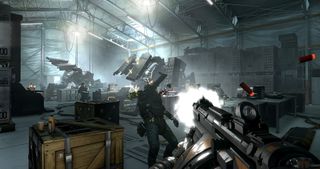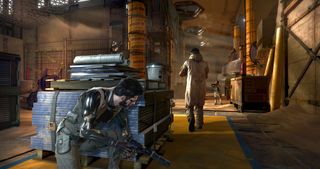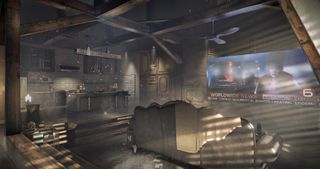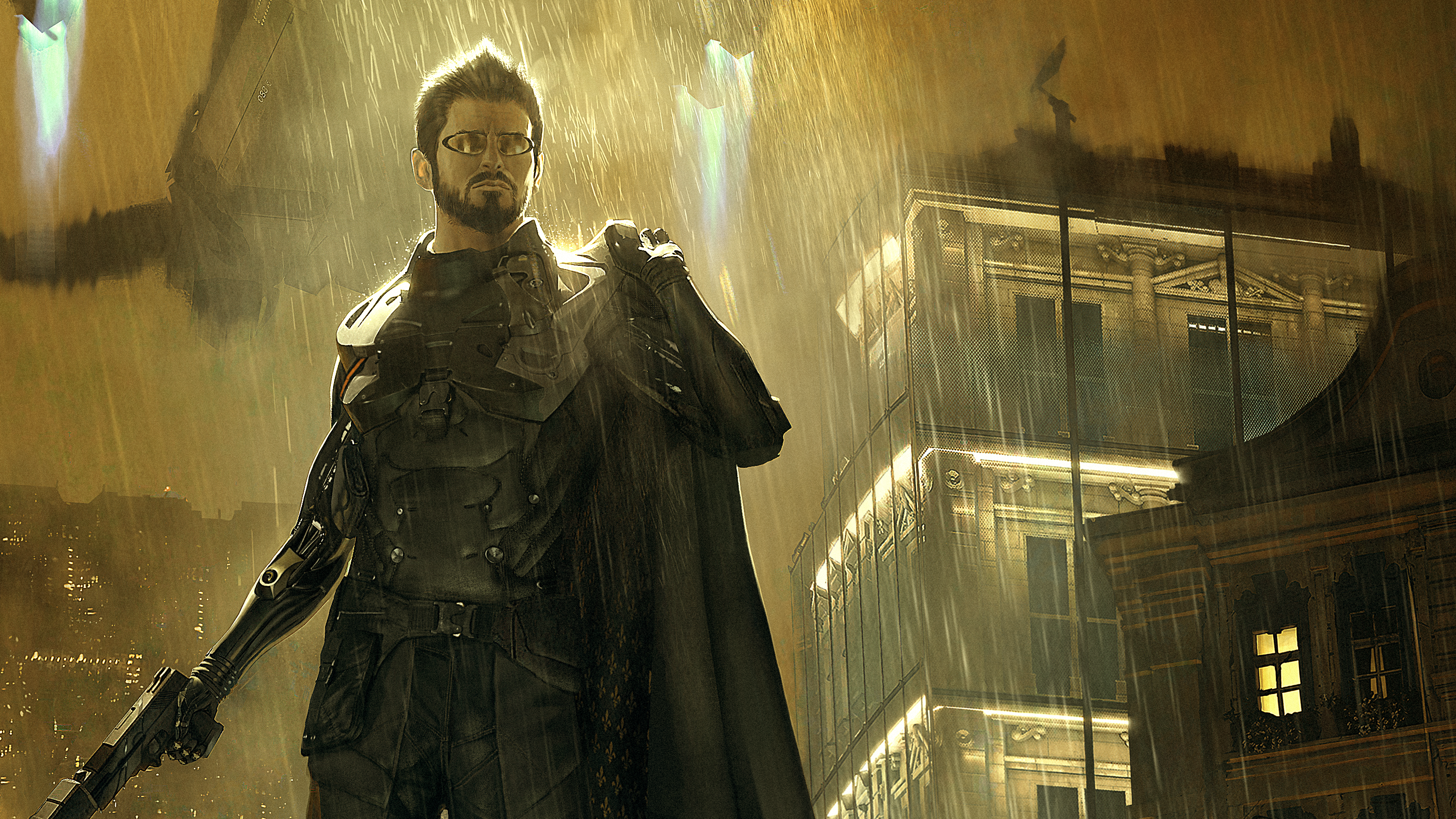GamesRadar+ Verdict
An excellent sequel that expands your toolbox and offers complex, multifaceted environments to explore.
Pros
- +
New augmentations build on old favourites
- +
Intricate environments with multiple routes
- +
They've fixed boss fights
- +
Loads of triangles
Cons
- -
Mankind's division is awkwardly handled
- -
Major characters are better rendered than minor ones
- -
Too many triangles?
Why you can trust GamesRadar+
I'm crouched in the lower vault of the Palisades Property Bank, Prague's premier data security facility. It's impenetrable, or so the unflappable receptionist would have me believe. My entry into one of its most secure areas says otherwise. I turn on my Glass-Shield Cloaking aug, rendering me temporarily invisible. Moving undetected through the laser tripwires, I take cover out of sight of the security turret. Using a multitool, I remotely hack a nearby door to the server room. Inside, I discover a large cable hatch that leads to the security booth. There's a single guard, but taking him down would alert his colleagues outside. I press a button on the wall, and the windows tint, obscuring the view into the booth. Guard down, I'm one step closer to opening the vault and looting its valuable contents.
What's great about Deus Ex: Mankind Divided is that none of this is mandated by the story. The bank has its place in the critical path, but I'm here of my own accord. And how I broke it open is specific to me. As with 2011's Human Revolution, my augmentations and tools are my own, picked based on my preference for stealth and non-lethality. Someone else might hack the turrets and security robots to kill the guards on their behalf. Another player could run in, detonating the typhoon augmentation that has returning protagonist Adam Jensen fire out explosive projectiles in every direction.
It works because the level design anticipates the range of possibilities, and offers interesting paths for each. Often this means spacious, Jensen-sized vents to crawl through, but there are options for every main mission, side quest or self-made personal project. Do you hack a keycode into a back entrance? Do you use your mechanical arms to stack crates until you can use your mechanical legs to jump up to a ledge? Do you just walk in the front door and deal with the consequences? Mankind Divided, much like every Deus Ex game before, is about the joy of planning, execution and on-the-fly decision making.
The majority of the action takes place in Prague, a huge city hub comprised of five districts split across two open areas. It's two years after the events of Human Revolution, and Jensen has taken a job hunting terrorists for a new Interpol taskforce. At the end of Human Revolution, augmented humans were driven into a 28 Days Later style rage. Mankind Divided runs with that thread, depicting a world that's grown fearful of the augmented. Prague is at the extreme of this global phenomenon, and has begun to segregate augmented and 'naturals'.

As civil rights allegories go, it's a little on the nose. Still, Mankind Divided does a good enough job of exploring the consequences of these events. Human Revolution explored the darker side of human augmentation. Prague's aug ghetto, Golem City, is this taken to its logical conclusion. The augmented CEOs and business leaders, meanwhile, are unaffected – busy constructing augmented havens away from the rest of the world. Throughout, moral decisions reinforce the hardships faced by augmented individuals, although rarely to any satisfying or particularly profound conclusion.
The biggest problem with Mankind Divided's focus on discrimination is Jensen himself. Dialogue choices offer the option to relate to Prague's augmented, but Jensen never experiences their plight. He's augmented, yes, but different. Special. Some of his colleagues don't like him, but never question his efficacy. His Interpol ID means he can happily walk onto a non-augmented train carriage and face nothing more than an angry cop checking his papers. And, unlike every other augmented human in the game, he doesn't need Neuropozyne to stop his body rejecting his mechanical limbs. People hate Jensen in the way they hate Geralt in The Witcher 3, which is to say they need him too much to do anything but make derogatory comments. But where The Witcher 3 uses discrimination as texture to flesh out the world, Mankind Divided makes it the backdrop.

Far better is the slowly unfolding conspiracy at the heart of Mankind Divided's action. Jensen has to find the perpetrators of a bombing at a Prague train station, and, in doing so, deals with an aug rights movements, a hacktivist collective, an augmented cult and more. This is the series' bread and butter, and while it's hardly original (the Illuminati are at it again), series fans should appreciate the ties to the original Deus Ex. It's an enjoyable yarn to unravel, and even offers some limited agency to nudge the story in minor, specific ways.
An additional complication comes from the new, experimental augs found dormant in Jensen. An intriguing story wrinkle, it's mainly a way to give him new powers. There's some fun stuff to toy with, including long-range stun, remote hacking, short-range teleport and armoured skin. They're all potentially useful tools, depending on your playstyle preference, and enhance the already entertaining suite of powers that return from Human Revolution. It's a broad enough selection that your choice isn't limited to just action or stealth, but to the specific method of either that most suits the way you want to play.
On top of that, Eidos Montreal adds weapon customisation and different ammo types. Mankind Divided offers both a broad toolbox, and a detailed, intricate environment. It's a satisfying combination, and the result is a game that's best enjoyed slowly and deliberately – picking apart Prague's secrets and ancillary missions before driving the story forward by flying off briefly to some other location. Sure, it would be nice to have a second major hub, akin to Human Revolution's Hengsha, but Prague's size and detail makes up for that – as does the fact that subsequent visits take place at a different time of day, and with new side quests.

It's much better looking than Human Revolution, too. Prague feels more like a real space, and Eidos Montreal uses the more powerful console hardware to offer larger areas filled with more clutter. And of course, it's filled with plenty of Eidos Montreal's absurd but striking futuristic design (read: triangles everywhere). Faces are more detailed and expressive, too, but also inconsistent – one of the most immersion breaking aspects of the game. Major NPCs are more detailed, which makes the minor ones look weird and out of place.
In terms of story, Human Revolution probably retains the edge because it focused on Jensen's character in a way that Mankind Divided doesn't. This new chapter shifts the world and its conspiracies along, and as a result doesn't have the same impact. But viewed as a series of systems and levels, Eidos Montreal has outdone itself. Mankind Divided is full of great moments, from the lengthy journey across The Throat of Golem City, to the simple pleasure of crouching in a Prague bank, wondering how next to proceed.
This game was reviewed on PC.
More info
| Description | Mankind has become divided by those with augments and those without and war is upon us. It's up to Adam Jensen once again to put a stop to all of this. |
| Franchise name | Deus Ex |
| UK franchise name | Deus Ex |
| Platform | "Xbox One","PS4","PC" |
| US censor rating | "Rating Pending","Rating Pending","Rating Pending" |
| UK censor rating | "","","" |
| Genre | Action |
Phil is the UK Editor of our sister site, PC Gamer. He's been writing for them for over a decade, initially starting out as a freelance writer specialising in MMOs. Now he leads PC Gamer's UK team, but still sometimes finds the time to write about his ongoing obsessions with Destiny 2, GTA Online, and Apex Legends. When he's not levelling up battle passes, he's checking out the latest tactics game or dipping back into Guild Wars 2.

